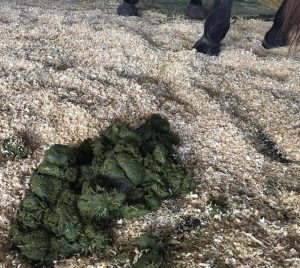Managing manure can be a challenge for horse owners. One horse can produce an average of 50 pounds of waste per day and with an estimated 385,000 horses in Florida, that waste piles up. A new UF/IFAS online tool helps horse owners identify ways to improve how they handle waste to benefit the health of horses, humans and Florida waterways.
Horse manure contains nitrogen and when significant amounts are introduced to water via leaching into groundwater or directly into a waterway, it has negative effects on water quality. Best management practices (BMPs) guide horse owners on how to reduce these potential impacts to Florida’s water quality.

The new, free tool allows horse owners to self-assess their waste management plan. The website also serves as a repository for resources and information on proper manure management.
“Manure management can become an unwieldy and frustrating part of horse ownership,” said Carissa Wickens, UF/IFAS Extension specialist. “Responsible horse ownership and equine property management includes being good stewards of the land and making sure we are properly handling the manure the horses produce.”
The goal is not perfect execution of every best management practice but instead have a plan and make incremental changes. Over time, that will make a significant difference and reduce negative impacts to water supply.
“There is not a one size fits all solution,” said Wickens. “We hope to help as many horse owners implement as many BMPs as possible, but we know there are some practices that will be difficult to adopt. It can be challenging and sometimes you have to get creative.”
Each farm will have their own unique needs and challenges when implementing BMPs. One simple way to get started is to understand where any sinkholes or water features are located on or around your farm and consider where manure is stored or disposed of. If your farm is near one of these areas, evaluate the available space on your farm and consider moving the manure. How and where manure is stored can go a long way to protect water quality, control odor and flies, improve health and support positive relationships with neighbors.
Composting manure can be another key strategy. Properly composting manure and reapplying it not only minimizes leaching of nutrients into waterways, but it protects horse and human health as well. Proper manure management reduces pathogens, improves pasture health and more.
“Implementing these practices helps protect water resources for many generations,” said Wickens. “It’s important for drinking water as well as the recreational aspect water resources contribute to the economic impact in our state.”
This project was made possible by funding from the Florida Department of Agriculture and Consumer Services Office of Agricultural Water Policy. The entire best management practices manual for Florida equine operations is available for further information.



